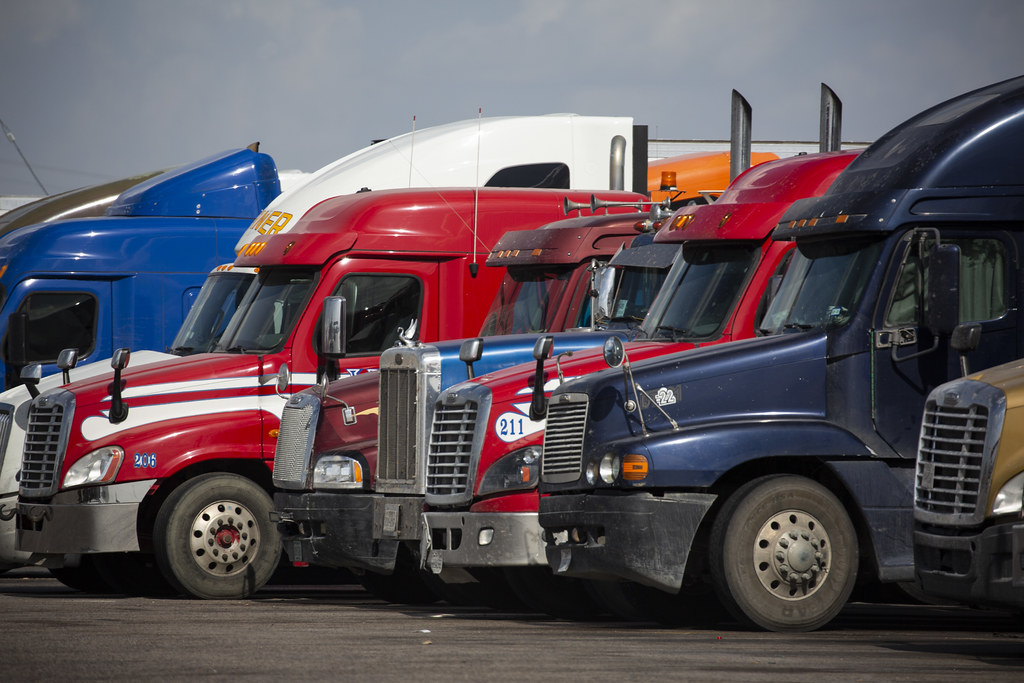Life for truck drivers in the United States is changing. From government mandates to the approach of greater automation to drastically lower wages, making a living behind the wheel of a big rig is becoming tougher every year. By some estimates, around 90% of those who take up the profession leave within the first year. And now, there’s a serious shortage of qualified drivers.
Andrew Kay got to know what drivers face today by meeting them at truck stops and on the road for a piece in Wired. He spoke with the Standard about what he learned about the struggles that modern truckers face.
This transcript has been edited lightly for clarity:
Texas Standard: Tell us about your travels and where you went to tell the story.
Andrew Kay: Well, I spent about a week at a truck stop in northern Illinois. I shadowed somebody called a trucker chaplain, who is a preacher in a converted semi that’s been kind of changed into a chapel. And I also spent time hanging out at the diner on the site, talking to as many truckers as I could. And at the end of the week, I caught a ride with an actual trucker. I rode shotgun with him on a route to the Everglades.
Wow. That’s really interesting. What did you discover along the way? I mean, a lot of people have this idea of what it takes to be a truck driver and what that life must be like. Was there anything that really surprised you?
Well, I discovered a lot. I discovered that trucking is a lot harder than it used to be. Trucking has always been extremely difficult, but I think that it’s changed of late. I would say that there’s a lot of monitoring and surveillance in trucking. Some drivers have what are called driver-facing cameras in their trucks that are trained on them, on their faces at all times, and keeping track of everything they do. And all drivers have what are called electronic logs that tell them when they can rest, when they have to drive.
So this is a job that used to be compared to being a cowboy. Truckers have long seen themselves as the last cowboys. But because of these incursions on their freedom, their independence, I think that that image is being threatened.
You know, it’s interesting because we haven’t even touched on issues like, say, the rising cost of living right now. And yet what we’re already seeing, what you’re reporting, is that there’s a real shortage of of truck drivers. Is a lot of this because of the quality of life as a truck driver, or does it get down to pay, or what do you see as the main issue here?
I think it’s a few things. I mean, as I note in the piece, ever since 1980, adjusting for inflation, the average annual income of a U.S. truck driver has gone from around $110,000 a year to around $48,000. I think one thing I would like to point out is that trucking has long been a ladder out of poverty in this country. It’s a really important blue-collar job that is not capable of being offshored, of course. And you don’t need any education to do this. You can not even have a high school diploma. You just need a commercial driver’s license. But the more we endanger it, the more we threaten to cut off that ladder. And I think it really needs to be protected.
Of course, there’s the automated trucking systems that are certainly being tested or have been tested in Texas. Are we talking about the disappearance of a not just a way of life, but an entire industry of work?
Well, self-driving trucks are being tested and engineered as we speak, including in Texas. But one of the key takeaways for me of this article is that in all likelihood, self-driving trucks are not coming anytime soon. So this future where you’re driving down the highway and you look up and see, you know, a semi in the adjacent lane screaming down the highway at 75 miles an hour with no one in it – I mean, that’s decades away.
What does this mean, though, for the industry – and taking it a step further, for the rest of us? I mean, if there are fewer people driving trucks making less money, what are the ripple effects here, and how might we be affected, those of us who don’t drive?
Well, I think it’s it comes down to things like supply chain delays. We all rely on truck drivers. You know, the cliche in the industry is that everything you own has passed through the hands of a truck driver. So I think one consequence of the fact that automated trucks are not actually coming anytime soon is that we’re not going to have any kind of technological silver bullet to these supply chain crises. The tech is not coming to solve this problem and to cure the truck drivers shortages. And so I think that means that we actually have to figure out ways to make this job more humane.
I think one way we can do that – one of the actionable ways that I mention in the article – is by repealing truck drivers’ exemption from overtime. I mean, to be a truck driver now, you basically have to put in at least 70 hours a week, all told. And yet truckers are banned from making overtime because of a piece of legislation dating back to 1938. So there’s a bill that’s making its way through the Senate right now that would rectify that. But that’s a really important thing that we have to somehow manage to set right.














